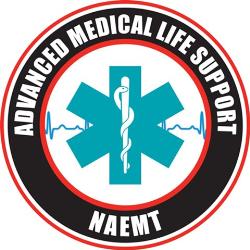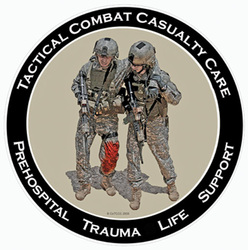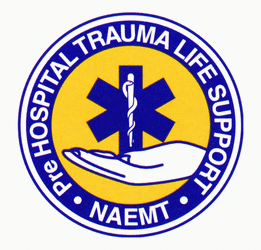Advanced Medical Life Support (AMLS)
course is sponsored by the National Association of EMTs (NAEMT) and endorsed by the National Association of EMS Physicians (NAEMSP). It addresses the most common medical complaints and offers a "think outside the box" method of assessing and managing patients in medical crises.
Using the scene size-up, history and physical exam, participants learn to systematically rule-out and rule-in possibilities and probabilities of medical problems. This course offers an assessment-based approach and then progresses to a diagnostic-based approach to developing treatment plans, resulting in a differential diagnosis.
Course structure:
AMLS is a sixteen (16) hour, two-day program that consists of interactive lectures, teaching and evaluation stations.
The interactive/case-based lectures include these topics:
• Patient assessment
• Airway management
• Assessment of the shock patient
• Dyspnea/respiratory failure
• Chest pain
• Altered mental status
• Abdominal pain
Prehospital Trauma Life Support (PHTLS)
is recognized around the world as the leading continuing education program for prehospital emergency trauma care.
PHTLS promotes excellence in trauma patient management through global education of all providers involved in the delivery of prehospital care. PHTLS is developed by NAEMT in cooperation with the American College of Surgeons Committee on Trauma.
PHTLS courses improve the quality of trauma care in your area and decrease mortality. The program is based on a prehospital trauma care philosophy, stressing the treatment of the multi-system trauma patient as a unique entity with specific needs. This may require an approach to the trauma patient that varies from traditional treatment modalities.
PHTLS promotes critical thinking as the foundation for providing quality care. It is based on the belief that, given a good fund of knowledge and key principles, EMS providers are capable of making reasoned decisions regarding patient care. The PHTLS course is continuously updated and revised to keep up with the advances in the field, ATLS Guidelines and feedback from PHTLS participants.
PHTLS programs are developed from the Advanced Trauma Life Support (ATLS) Program, a course for physicians developed by the American College of Surgeons Committee on Trauma. They follow the principles of trauma care developed by the Committee on Trauma. The Committee provides the medical direction and content oversight for the PHTLS program.
Although PHTLS originated in the United States, it has evolved and now serves as an international education program available to EMS providers in 42 countries including Aruba, Argentina, Australia, Austria, Belgium, Bolivia, Brazil, Brunei, Canada, Chile, Colombia, Denmark, Dominican Republic, Ecuador, France, Georgia, Germany, Greece, Kenya, Ireland, Israel, Italy, Japan, Lithuanian, Luxembourg, Mexico, Netherlands, Norway, Oman, Paraguaya, Peru, Philippines, Poland, Portugal, Saudi Arabia, Serbia, South Africia, Spain, Sweden, Switzerland, United Arab Emirates (UAE), and Uruguay
The Tactical Combat Casualty Care (TCCC)
course introduces evidence-based, life-saving techniques and strategies for providing best-practice trauma care on the battlefi eld. TCCC has been documented to produce dramatic improvements in casualty survival in Iraq and Afghanistan.The National Association of Emergency Medical Technicians (NAEMT) conducts TCCC courses under the auspices of its Prehospital Trauma Life Support (PHTLS) program, the recognized world leader in prehospital trauma education. NAEMT’s TCCC courses use the PHTLS Military textbook and are fully compliant with the Department of Defense’s Committee on Tactical Combat Casualty Care (CoTCCC) guidelines. TCCC is the only set of battlefi eld trauma care guidelines endorsed by the
American College of Surgeons.PHTLS combines the expertise of worldclass trauma surgeons, emergency physicians, paramedics and EMS educators. NAEMT’s TCCC courses are taught by a global network of experienced instructors fully trained in both
PHTLS and TCCC. NAEMT maintains a strict quality control program for its instructors.To support course sites, instructors and students, NAEMT maintains a network of TCCC regional coordinators both in the U.S. and internationally, and staff at its Headquarters Offi ce. Course administration is streamlined and cost-effective.
NAEMT’s TCCC course is accredited by the Continuing Education Coordinating Board for Emergency Medical Services (CECBEMS) and recognized by the National Registry of EMTs (NREMT).Battlefi eld Trauma Care – the PHTLS advantage
TCCC course is designed for combat medical personnel, including medics, corpsmen and pararescue personnel deploying in support of combat operations. The course’s content and structure also can be modifi ed for law enforcement special weapons and tactics and special response teams.
course is sponsored by the National Association of EMTs (NAEMT) and endorsed by the National Association of EMS Physicians (NAEMSP). It addresses the most common medical complaints and offers a "think outside the box" method of assessing and managing patients in medical crises.
Using the scene size-up, history and physical exam, participants learn to systematically rule-out and rule-in possibilities and probabilities of medical problems. This course offers an assessment-based approach and then progresses to a diagnostic-based approach to developing treatment plans, resulting in a differential diagnosis.
Course structure:
AMLS is a sixteen (16) hour, two-day program that consists of interactive lectures, teaching and evaluation stations.
The interactive/case-based lectures include these topics:
• Patient assessment
• Airway management
• Assessment of the shock patient
• Dyspnea/respiratory failure
• Chest pain
• Altered mental status
• Abdominal pain
Prehospital Trauma Life Support (PHTLS)
is recognized around the world as the leading continuing education program for prehospital emergency trauma care.
PHTLS promotes excellence in trauma patient management through global education of all providers involved in the delivery of prehospital care. PHTLS is developed by NAEMT in cooperation with the American College of Surgeons Committee on Trauma.
PHTLS courses improve the quality of trauma care in your area and decrease mortality. The program is based on a prehospital trauma care philosophy, stressing the treatment of the multi-system trauma patient as a unique entity with specific needs. This may require an approach to the trauma patient that varies from traditional treatment modalities.
PHTLS promotes critical thinking as the foundation for providing quality care. It is based on the belief that, given a good fund of knowledge and key principles, EMS providers are capable of making reasoned decisions regarding patient care. The PHTLS course is continuously updated and revised to keep up with the advances in the field, ATLS Guidelines and feedback from PHTLS participants.
PHTLS programs are developed from the Advanced Trauma Life Support (ATLS) Program, a course for physicians developed by the American College of Surgeons Committee on Trauma. They follow the principles of trauma care developed by the Committee on Trauma. The Committee provides the medical direction and content oversight for the PHTLS program.
Although PHTLS originated in the United States, it has evolved and now serves as an international education program available to EMS providers in 42 countries including Aruba, Argentina, Australia, Austria, Belgium, Bolivia, Brazil, Brunei, Canada, Chile, Colombia, Denmark, Dominican Republic, Ecuador, France, Georgia, Germany, Greece, Kenya, Ireland, Israel, Italy, Japan, Lithuanian, Luxembourg, Mexico, Netherlands, Norway, Oman, Paraguaya, Peru, Philippines, Poland, Portugal, Saudi Arabia, Serbia, South Africia, Spain, Sweden, Switzerland, United Arab Emirates (UAE), and Uruguay
The Tactical Combat Casualty Care (TCCC)
course introduces evidence-based, life-saving techniques and strategies for providing best-practice trauma care on the battlefi eld. TCCC has been documented to produce dramatic improvements in casualty survival in Iraq and Afghanistan.The National Association of Emergency Medical Technicians (NAEMT) conducts TCCC courses under the auspices of its Prehospital Trauma Life Support (PHTLS) program, the recognized world leader in prehospital trauma education. NAEMT’s TCCC courses use the PHTLS Military textbook and are fully compliant with the Department of Defense’s Committee on Tactical Combat Casualty Care (CoTCCC) guidelines. TCCC is the only set of battlefi eld trauma care guidelines endorsed by the
American College of Surgeons.PHTLS combines the expertise of worldclass trauma surgeons, emergency physicians, paramedics and EMS educators. NAEMT’s TCCC courses are taught by a global network of experienced instructors fully trained in both
PHTLS and TCCC. NAEMT maintains a strict quality control program for its instructors.To support course sites, instructors and students, NAEMT maintains a network of TCCC regional coordinators both in the U.S. and internationally, and staff at its Headquarters Offi ce. Course administration is streamlined and cost-effective.
NAEMT’s TCCC course is accredited by the Continuing Education Coordinating Board for Emergency Medical Services (CECBEMS) and recognized by the National Registry of EMTs (NREMT).Battlefi eld Trauma Care – the PHTLS advantage
TCCC course is designed for combat medical personnel, including medics, corpsmen and pararescue personnel deploying in support of combat operations. The course’s content and structure also can be modifi ed for law enforcement special weapons and tactics and special response teams.



